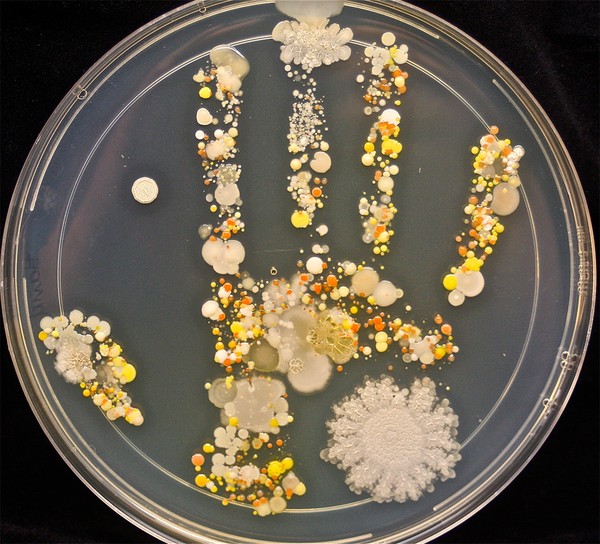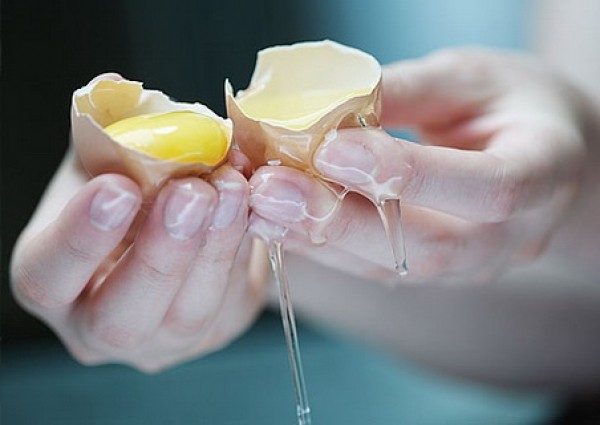5 scary bacteria on your hand
Experts recommend that lazy hand washing will cause harmful bacteria to become more rooted and harmful to the human body.
Scary bacteria on your hands
Recently, Tasha Sturm - a laboratory technician in California (USA) has published a picture of the lives of bacteria often residing on our hands.
To be able to complete this work, she asked her 8-year-old son to go out on a tight grip on a specialized gel in bacterial culture. The gel will be stubbed by Sturm for a few days for bacteria to grow.

Images of "blooming" bacteria on the hands of an 8-year-old boy who just plays outside.
As a result, she obtained many species of bacteria with extremely attractive color characteristics. Sturm said, there are good bacteria for the body, but there are bacteria that can make you sick at any time.Washing your hands often with soap will partly help repel the bacteria that make up our hands.
Let's review the types of bacteria that may reside in your hand through the article below.
1. Salmonella
Salmonella is a rodent bacterium belonging to the Enterobacteriaceae family - with the same family of famous E. coli bacteria causing diarrhea. Salmonella is found all over the world, they cause diseases such as typhoid fever, malaria and food poisoning.

This bacterium is often found in raw eggs, undercooked poultry, raw vegetables . and spreads quickly when a person eats food that has been contaminated or comes into contact with animal / human waste. infection. As long as Salmonella lives in your hands, you can "eat" them at any time.
According to experts, Salmonella is the culprit causing 93.8 million cases of poisoning in the world every year. According to a 2011 report from the US Centers for Disease Control, more than 1 million Americans are infected with Salmonella each year, of which about 20,000 are hospitalized and nearly 400 deaths.

Symptoms of Salmonella infected patients are diarrhea, fever and abdominal pain within 8-12 hours after eating contaminated food.
In some cases in children and the elderly, patients may become dehydrated resulting in more serious complications. Salmonella can be prevented by clean hands.
2. Listeria
Listeria bacteria can easily be found in nature such as in soil, animal manure, sewage, mud, and damaged vegetables, especially in green grass that has not been dried.
Unlike its peers, Listeria is able to grow even in low temperature environments such as refrigerators but will proliferate in the 45 degree Celsius environment.
Bacteria from the gastrointestinal tract penetrate into the blood and tissues of infected people, thereby moving to susceptible cells and multiplying many times. People at high risk for the disease are infants, middle-aged people, immune-compromised people and pregnant women.

Listeria can cause gastroenteritis , along with flu-like symptoms. In some special cases, they can cause sepsis and even meningitis . Without timely intervention, the likelihood of death is quite high.
The advice given to prevent Listeria virus infection is to cook food thoroughly and clean your hands to prevent foodborne infection.
3. Escherichia Coli (E.coli)
Also known as colon bacteria , E.coli is one of the main bacteria that parasites in the intestines of hot-air animals. Although a bacterium essential for digesting food, E.coli can also turn into an enemy's body when it comes to diarrhea.

The mutant strains of E.coli have really dangerous characteristics and become a formidable bacterium for human health.E.coli can cause diarrhea, fever, and more can cause blood disorders and kidney failure.
This type of bacteria is spread by stool - hand - mouth . They are transmitted from the middle to the middle of the hand, food, drinking water . and are put into the body by mouth.

They may also exist on uncooked meat and contaminated river water. Therefore, an important recommendation for preventing E. coli is to wash your hands well before eating.
4. Staphylococcus aureus
Staphylococcus aureus or staphylococcus aureus is a Gram staph and the most common cause of infection among staph. They are often found under the skin, hair as well as in the nose and throat of humans and animals.

Staphulococcus can cause food poisoning due to unsafe food processing and food is not preserved carefully. At room temperature, they reproduce quickly and produce a poison that can cause illness in humans.
The most common cause of poisoning caused by Staphylococcus is by processing food with bare hands and not cooking it well afterwards. The bacteria will follow the pathways of the food through salads, breads or sandwiches . and follow the human body.

Therefore, in addition to keeping food clean and sterilized, you need to make sure your hands are clean before preparing food because this is said to be one of the ways to prevent this bacteria.
5. Bacillus (bacillus)
Bacillus is a genus of rod-shaped bacteria belonging to the Bacillaceae family. Unlike most bacteria of this genus that are probiotic, some Bacillus cereus strains can cause food poisoning.

This bacterium produces two types of toxins: toxins of diarrhea and toxins that cause vomiting. In which toxins cause diarrhea will destroy the epidermis and intestinal mucosa, even leading to death and toxins causing vomiting are high vitality and not decomposed by high temperature or gastric juice.
Bacillus cereus is commonly found in soil and sometimes in foods from near-ground crops such as beans, cereals and spices.

Accordingly, despite being fully cooked, these foods still contain Bacillus cereus pathogens. This bacterium can grow in wet environments, spread through the hands when processing and serving food.
Therefore, expert advice on preventing Bacillus cereus infection is to keep food cold in the refrigerator accompanied by clean hands before / after cooking.
- Bacteria are transforming themselves against hand-washing and sanitizing solutions every day
- Forget sharks, these 5 bacteria also make you
- Improper hand drying also spreads bacteria
- WHO put recommendations on what to do to prevent the spread of resistant bacteria
- Special note when using hand sanitizer regularly
- The danger of using hand sanitizer regularly
- The scary truth about antibiotic-resistant bacteria
- You will stop using the hand dryer in the toilet immediately after reading this article
- Hand washing: Simple but effective preventive measures
- Washing your hands with warm water does not kill bacteria
- Wash your hands, act small to save many lives
- The most toxic and strange forms of bacteria on the planet
 Why do potatoes have eyes?
Why do potatoes have eyes? 'Tragedy' the world's largest carnivorous life: Death becomes ... public toilet
'Tragedy' the world's largest carnivorous life: Death becomes ... public toilet Tomatoes were once considered 'poisonous' for 200 years
Tomatoes were once considered 'poisonous' for 200 years Detecting microscopic parasites on human face
Detecting microscopic parasites on human face The hidden fuel of the human brain: How gut bacteria shape intelligence?
The hidden fuel of the human brain: How gut bacteria shape intelligence?  New bacteria appear in unexpected places
New bacteria appear in unexpected places  3,600-year-old cheese 'reveals' secrets of ancient food preparation
3,600-year-old cheese 'reveals' secrets of ancient food preparation  Spanish mother and daughter experts 'train' bacteria to restore paintings
Spanish mother and daughter experts 'train' bacteria to restore paintings  NASA is worried about mutant bacteria in the Space Station spreading to Earth
NASA is worried about mutant bacteria in the Space Station spreading to Earth  Identifying the deadly link between oral bacteria and cancer
Identifying the deadly link between oral bacteria and cancer 